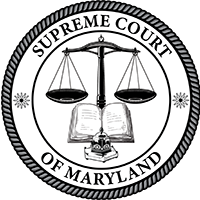SCHEDULE OF ORAL ARGUMENTS
September Term, 2020
Thursday, October 1, 2020:
AG No. 19 (2019 T.) Attorney Grievance Commission of Maryland v. Ferdinand Uchechukwu Ibebuchi
Attorney for Petitioner: Michael W. Blow, Jr.
Attorney for Respondent: Ferdinand U. Ibebuchi
No. 6 Lolita D. Fowlkes v. Shabbir Ahmed Choudhry
Issue – Torts – Did CSA err in its formulation and application of Maryland law regarding what a wrongful death plaintiff must prove in order to recover damages for the loss of household services that would have been provided by Petitioner’s deceased adult child?
Attorneys for Petitioner: Thomas C. Cardaro and C. Drew Fritch
Attorneys for Respondent: John R. Fischel and Edward W. Brady
No. 3 State of Maryland v. Latoya Bonte Elzey
Issue – Criminal Law – Was CSA wrong in holding that a jury may not be instructed to find that the victim abused the defendant and the defendant suffers from Battered Spouse Syndrome before considering expert testimony on the syndrome?
Attorney for Petitioner: Carrie J. Williams
Attorney for Respondent: James W. Kirkpatrick
Friday, October 2, 2020:
AG No. 46 (2019 T.) Attorney Grievance Commission of Maryland v. Mary Theresa Keating
Attorney for Petitioner: Raymond A. Hein
Attorney for Respondent: Irwin R. Kramer
No. 1 Nationwide Property & Casualty Insurance Company, et al. v. Selective Way Insurance Company
Issue – Civil Procedure – Did CSA err in ruling that prejudgment interest is not recoverable as a matter of right on amounts paid for defense costs where a liability insurer breaches its duty to defend?
Attorneys for Petitioner: Steven E. Leder and Julie F. Maloney
Attorney for Respondent: Edward J. Brown
No. 2 Devon Jordan Taylor v. State of Maryland
Issues – Criminal Law – 1) Where the only disputed issue at trial was identity, and the only evidence of identity was the victim’s identification of Petitioner, did CSA misapply the harmless error test in holding that an erroneously-given “anti-CSI effect” jury instruction was harmless beyond a reasonable doubt because the testimony of the victim is legally sufficient to sustain the convictions? 2) If preserved, should review of the trial court’s scientific evidence instruction be based on law existing at the time of the trial in 2008 and not based on this Court’s decisions in Atkins v. State, 421 Md. 434 (2011), and Stabb v. State, 423 Md. 454 (2011)? If so, did the trial court act within its discretion when it gave the scientific evidence instruction when the instruction was proper under then existing law, i.e., Evans v. State, 174 Md.App. 549 (2007)? 3) When Petitioner took exception to the scientific evidence instruction but did not state any particular grounds for the objection, did Petitioner fail to preserve for appellate review the question of the claimed error of the trial court’s instruction?
Attorney for Petitioner: Allison P. Brasseaux
Attorney for Respondent: Jessica V. Carter
Monday, October 5, 2020:
AG No. 37 (2019 T.) Attorney Grievance Commission of Maryland v. Nicholas G. Karambelas
Attorney for Petitioner: Raymond A. Hein
Attorney for Respondent: Nicholas G. Karambelas
No. 4 Dale K. Byrd v. State of Maryland
Issues – Criminal Law – 1) Did CSA err in holding that Petitioner’s guilty pleas were valid even though the State did not disclose material impeachment evidence about key police witnesses (including evidence of lying in federal court and falsifying a warrant)? 2) Did the non-disclosure of the evidence violate the State’s constitutional discovery obligation under Brady v. Maryland, 343 U.S. 83 (1963), and its progeny? 3) Did the non-disclosure of the evidence constitute a misrepresentation by the State rendering the pleas invalid under Brady v. United States, 397 U.S. 742 (1972), and its progeny?
Attorney for Petitioner: Michael T. Torres
Attorneys for Respondent: Carrie J. Williams
No. 5 Tyson Farms, Inc., et al. v. Uninsured Employers' Fund
Issues – Labor & Employment – 1) Did CSA err in reversing the trial court’s determination that the jury should resolve conflicting facts and inferences regarding whether Mr. Garcia was Petitioner’s employee? 2) Did CSA err in concluding that no reasonable jury could find that Mr. Garcia was not Petitioner’s employee, even though Petitioner’s contract was with the owner of the farm, and Petitioner did not hire (or fire) Mr. Garcia; pay him; set his hours or wages; or have a contract with him?
Attorney for Petitioner: Eric B. Wolff
Attorney for Respondent: David K. Stesch
After October 5, 2020, the Court will recess until October 29, 2020.
SUZANNE C. JOHNSON
CLERK
Pursuant to the June 3, 2020 Amended Administrative Order on the Progressive Resumption of Full Function of Judiciary Operations Previously Restricted Due to the COVID-19 Emergency and the June 18, 2018 Administrative order on the Implementation of Remote Electronic Participation in Judicial Proceedings, the Court will hear oral arguments in these cases by videoconferencing.

